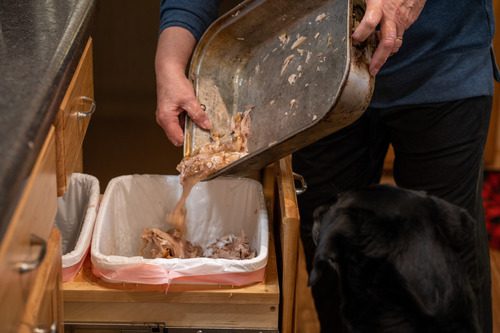What Dog Vaccinations Are Required in Alameda, CA
There is only one legally required dog vaccination, and that is for rabies. However, there are several other vaccinations that are necessary for a dog’s health. In fact, though they are not legally required, some vaccinations are essential for a dog’s survival past puppyhood. And most boarding facilities and doggy daycares will not accept a canine client without a veterinarian’s confirmation of their vaccines.
There is a series of vaccinations that are considered the “core” vaccinations. These are not required by law but should be considered vital. These begin when your dog is a puppy, at around six to eight weeks old, with boosters given every three to four weeks until at least 16 weeks of age. This is very similar to the shot series that children receive in infancy and through childhood. Dogs need their booster shots too, and after the series of “core” puppy vaccinations, dogs will need more shots in adulthood.

Core Vaccinations for Dogs
Included in the series of “core” vaccinations is the DAP and Leptospirosis vaccines. This includes vaccination against Distemper, Hepatitis, Leptospirosis, and the Parvovirus. Sometimes the vaccination for leptospirosis is not included, so ask your vet to verify that your dog is receiving all the shots they need.
Often prevention for Bordetella, which is the main cause of kennel cough, Canine Influenza, Lyme disease through flea and tick control, and heartworm are all included in preventative care. But again, discuss with your vet what is recommended for your dog. Without full prevention, a simple tick or mosquito bite could turn into a lifelong health struggle for you and your canine.
What Can Happen if Your Dog is not Fully Vaccinated?
There can be serious consequences for your dog and other dogs if your dog is not properly and fully vaccinated. Rabies, parvovirus, and canine hepatitis can all be potentially fatal. Extremely infectious diseases can spread fast and impact your dog’s health faster.
Especially for canine hepatitis, once a dog has been exposed they can be treated for symptoms but may need treatment for the rest of their life. Parvovirus is a highly contagious gastrointestinal virus and mainly a disease of unvaccinated puppies, but it can affect dogs of all ages. It is very possible that a puppy who contracts parvovirus will not live to be old enough for their first rabies shot. Bordetella is another that is contagious, a bacterium that spreads from dog to dog in close quarters. It contributes to what is commonly referred to as “kennel cough.” There is treatment for kennel cough but vaccination helps to reduce the risk of contraction.
Luckily due to vaccination, incidence rates of these serious and sometimes fatal illnesses have gone down and continue to decrease. The more pet owners vaccinate their dogs and cats, the less disease and fatal results we will see.
The reason that rabies is the only vaccination actually required by law is that it not only causes harm to an individual pet, but can be spread to other animals, including humans. This is referred to as “dog-mediated rabies.” According to the World Health Organization, rabies in canines is fatal 100% of the time once symptoms are diagnosable, and 99% of human transmission cases are from domestic dogs. Therefore it is required by California state law for dogs to be vaccinated against rabies. This is the best way to not only prevent rabies in dogs but also in humans.
Symptoms of rabies include paralysis of the throat and jaw, as well as the commonly known foaming of the mouth. If anyone is bitten by a dog or a wild animal, a doctor should be seen immediately before symptoms of rabies are allowed to set in. This also goes for dogs who have been bitten, or any other animal. Immediate attention is essential not just for effective treatment but for prevention of spreading further.
Leptospirosis is another disease that, like rabies, can spread from dogs to humans. This can be prevented by vaccinating dogs for Leptospirosis, reducing the risk of illness for both you and your pet. Leptospirosis is contracted usually by a dog drinking still water that has been contaminated by the urine of, say, a squirrel. It is a bacterial infection with serious consequences. For your dog’s sake and your own, talk with your veterinarian about giving your dog the Leptospirosis vaccine.
Just because rabies is the only legally required vaccine for dogs does not mean that it is the only vaccination your dog should have. It is one of many that are necessary for a long and healthy life. Not only that, but most doggy daycares, kennels or boarding facilities, groomers, and dog walkers will not do business with a dog that is not fully vaccinated. Dogs without vaccinations should not even use the dog park, as they could contract or give a serious disease very easily.
The Importance of Getting Your Dog Vaccinated
There are health risks not just for your dog, but for the other dogs and the humans interacting with the dogs. Not to mention the liability. No facility wants to have a kennel cough outbreak. And no one wants to be the one that caused it.
Not ensuring proper vaccination could end up deadly for a pup. Vaccination is a pet owner’s responsibility. Vaccination will not only protect your dog and other animals, but it will stave off costly treatments for easily preventable diseases.
Even though rabies is the only legally required vaccination, the entire DAP and Leptospirosis series as well as Bordetella, Lyme, and heartworm prevention should be treated as essential to a dog’s health and safety. For more information on vaccinations, call Providence Veterinary Hospital East at (510) 521-6608 or West at (510) 521-5775.
Recent Posts
Why Are Dogs Scared of Loud Noises?
Why Are Dogs Scared of Loud Noises? Loud noises can be a significant source of stress and…
Ways to Keep Your Cat Away from Christmas Tree
Ways to Keep Your Cat Away from Christmas Tree The holiday season brings joy, decorations, and the…
My Dog Ate a Turkey Bone: What Should I Do?
My Dog Ate a Turkey Bone: What Should I Do? Thanksgiving and other holiday gatherings often include…
Dog Runny Nose: Possible Causes for a Runny Nose
Dog Runny Nose: Possible Causes for a Runny Nose A dog runny nose can be a common…
Feline Obesity: When You Should Be Concerned with Your Cat’s Weight
Feline Obesity: When You Should Be Concerned with Your Cat’s Weight Feline obesity is a growing concern…
Providence Veterinary Hospital & Clinic serve Alameda, CA as well as Oakland, San Leandro, and the surrounding areas with superb veterinary medicine and gentle, compassionate care. We’ve been a part of this community since 1947 when a veterinarian started seeing pets in his home after the end of World War II. He built an animal hospital right under his house, and that’s where we remain to this day (with modern remodeling in 2016, to outfit the hospital with the latest medical technology and equipment, of course!).





